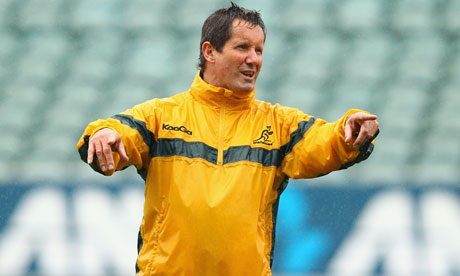
Shortly before Robbie Deans took over as the Australia coach, he sought out an old friend, John Wright, the former New Zealand opening bat who subsequently coached India. Deans wanted to know what it felt like to oppose your own country, to plot the downfall of a team so dear to your heart. How could he cope when the All Blacks played Australia? Let alone in a World Cup semi-final at Eden Park, with 4.4m Kiwis praying for him to fail.
As Deans freely admits, Wright's advice was both sage and reassuring. "I put the question to him because he'd coached the Indian cricket side against New Zealand. His explanation was that it was like competing against your brother. You've got respect for your brother, you know him well, and you know each other's strengths and weaknesses."
In other words, Deans knows precisely how New Zealanders are feeling right now. No one enjoys being outwitted by a smart-arse brother, particularly with the world watching.
The trick, at such times, is not to let rational judgment be clouded by the red mists of sibling rivalry. Deans may be back on familiar ground, the rugby equivalent of Arsène Wenger returning to the Emirates Stadium as manager of Manchester United. But there are also raw family emotions that transcend sport and his old rivalry with the All Black coach, Graham Henry. His sister, Nicky, is married to Jock Hobbs, formerly the chairman of the New Zealand Rugby Football Union and now battling leukaemia. Deans and Hobbs were contemporaries at Christ's College in Christchurch and team-mates for Canterbury and New Zealand. "We go back a long way," Deans saidon Friday. "I thought he was coming to visit me when we were at school but it turned out to be my sister."
It simply adds another layer of complex human interest to a richly compelling tale of everyday Tasman rivalry. After New Zealand had tumbled out of the 2007 World Cup in the quarter-finals, Deans was interviewed for the All Black coaching job he craved, having steered the hugely successful Crusaders to five Super Rugby titles. In the end the decision was made to stick with Henry and his assistants Wayne Smith and Steve Hansen, Hobbs having withdrawn from the selection panel citing a possible conflict of interest. It has been claimed Deans and Steve Tew, the NZRU chief executive, shared a mutual antipathy and the board may have felt it politically expedient to opt for four more years of Henry. Whatever, Deans was swiftly offered alternative employment across the "ditch" and now looms as the All Blacks' worst nightmare.
Because Deans, who won five New Zealand caps in the 1980s, has done an outstanding job of restoring Wallaby morale, trusting in talented youth and encouraging them to think on their feet. "Collective ownership" is one of his phrases, which helps explain why the Wallabies beat South Africa last weekend with minimal ball. "It's not about individuals, it's about how effective they are together as a team," Deans says. "I not only want the blokes to enjoy the experience but to succeed and have something to show for it. That'll never change."
There have been bumps along the dusty outback road for Dingo – "That's the nickname I hear, I'm sure I've got others" – since 2008. During his first year Australia lost three consecutive Tests to Henry's New Zealand and the Wallabies also slumped to a record 53-8 loss against South Africa. As recently as this year they were beaten by Samoa, while the pool defeat to Ireland was another low. Against that, they turned over New Zealand in Brisbane in August to clinch the Tri-Nations title for the first time in 10 years. Would Deans, 52, feel a warm glow of self-justification if he wins the big one? "I never feel vindicated. You constantly want more but I don't seek vindication. I seek to do the job to the best of my ability. Regardless of outcomes, even if we were ultimately to win a World Cup, there will always be those who don't think I should be around."
If Deans – "He's not the emotionless fish people think he is," Hansen says – has looked surprisingly relaxed lately, it is because he has already glimpsed the dark side of a World Cup semi-final. Back in 2003, he was part of John Mitchell's coaching team who scowled their way to defeat against the Wallabies in Sydney. "Every experience you have contributes to who you are. There's no doubt experience is valuable and it hardens you. I believe it's probably been an advantage."
He has revealed an unsentimental edge in selection, omitting Nathan Sharpe, his 99-times capped lock, from the matchday 22 in favour of Queensland's Rob Simmons. The ex-Wallaby centre Matt Giteau calls it "a huge mistake" but Deans is seeking improvement on the Springbok effort. "That was very much resolute defence, not a lot else. We'll have to bring more to the table and ask more of the All Blacks. We're expecting the best from the All Blacks. There's no doubt they'll bring that."
It would help if Kurtley Beale passes a fitness test on his tweaked hamstring. Whether he does or not, Henry is right to beware the Wallabies – "It does not matter who is coaching Australia, it could be Ms Gillard [the prime minister]" – who have beaten New Zealand twice before in World Cup semi-finals. Deans, whose great-uncle, Bob Deans, and brother, Bruce, were also All Blacks, is certainly not basking in the legend of the silvery fern. "My sister said it was family first but I suspect in Bruce's case, having been an All Black, he may not see it that way. It's often suggested to me I must have mixed emotions but I'm firmly embedded. I consider myself totally lucky to be doing what I'm doing with the men I'm doing it with. It's a privilege." No wonder the Kiwis are twitchy.

